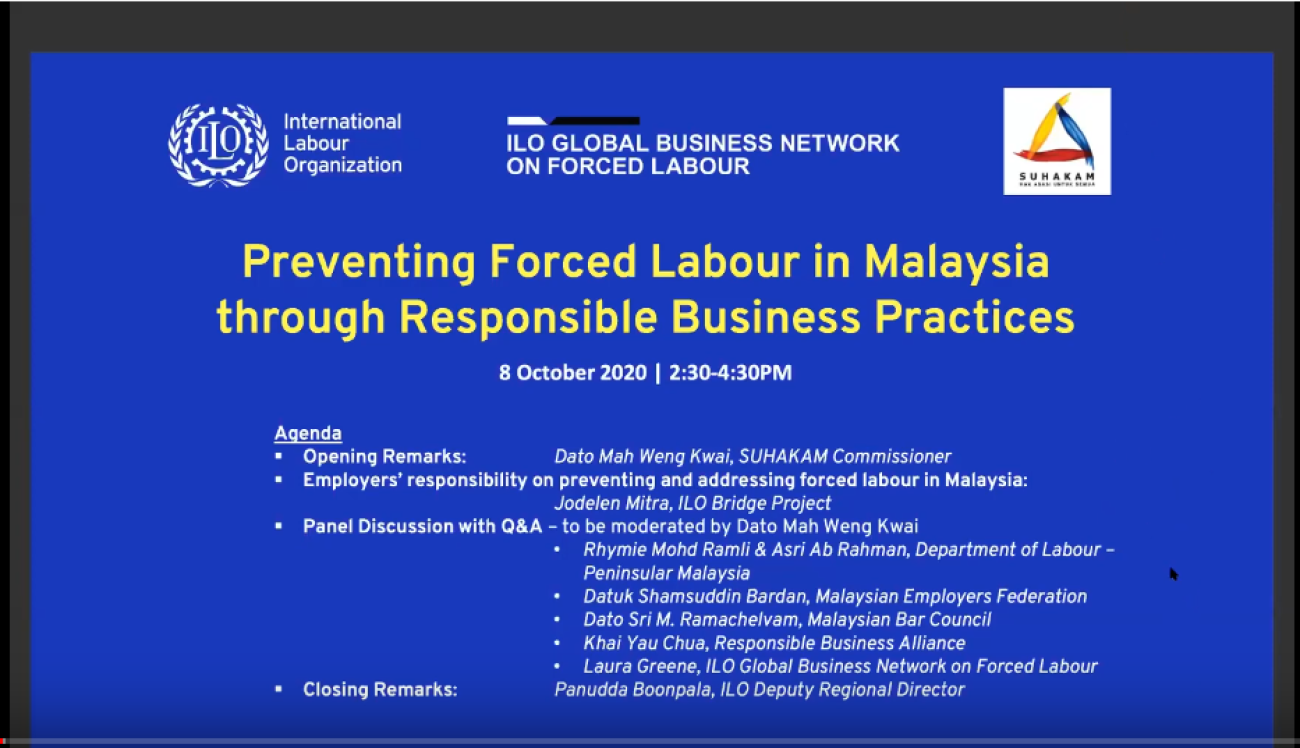Strengthening responsible business practices to prevent forced labour in Malaysia

The pandemic is exacerbating risks of forced labour among workers & employers in Malaysia. A recent ILO event saw partners discuss ways to counter the risk.
Expressing concern that the COVID-19 pandemic is exacerbating the risk of forced labour among workers and employers in Malaysia, international and national agencies urged the business community to enact responsible business practices to prevent forced labour, in an online meeting, held by the ILO and Commission on Human Rights of Malaysia, on 8 October 2020.
The webinar, entitled “Preventing Forced Labour through Responsible Business Practices”, highlighted the importance of business risk assessment and mitigation on forced labour in order to protect workers’ rights and avoid business exposure to financial, legal and reputational risks.
“Forced Labour is a grave human rights violation and should never be tolerated. This is why due diligence, and prevention measures through national and company policies to avoid forced labour from happening is important and should be in place,” said Panudda Boonpala, the Deputy Regional Director of the ILO Regional Office for Asia and the Pacific.
“Risk assessment processes and mitigation measures have to be instituted by every employer. It is necessary to also ensure that potential victims of forced labour are aware of and will have fair access to legal remedies,” she added.
The COVID-19 pandemic is affecting both businesses and workers. With widespread business disruptions, workers are losing their jobs, or their working and living conditions are severely affected. This makes workers more vulnerable to be tricked and trapped in forced labour.
“All workers have human rights. Respect them. They are not slaves!”, said Dato’ Mah Weng Kwai, Commissioner of the Human Rights of Malaysia (SUHAKAM) in his opening remarks.
Malaysian government officials, employees, employers, civil society organizations, students and other organizations participated in the event during which practical tips were shared on how to address, prevent and eliminate risks of forced labour during recruitment and employment, referring to the ILO-MEF guidebook for employers.
A panel discussion, also took place with the participants from Malaysia’s Ministry of Human Resources, the ILO Global Business Network on Forced Labour, the Malaysian Employers Federation, the Responsible Business Alliance and Malaysian Bar Council discussing the role of government and employers as well as good practices to address forced labour issues.
The webinar was co-organized by ILO’s United States Department of Labor funded Bridge Project “From Protocol to Practice and Bridge to Global Action on Forced Labour”, the ILO Global Business Network on Forced Labour (ILO-GBFNL), and SUHAKAM.
For further information, please contact
Jodelen Mitra
Technical Officer Bridge Project
mitra@ilo.org.
Funding is provided by the United States Department of Labor under cooperative agreement number IL-27592-15-75-K—1. 100 percentage of the total costs of the global Bridge Project is financed with Federal funds, for a total of US$17,395,138. This material does not necessarily reflect the views or policies of the United States Department of Labor, nor does mention of trade names, commercial products, or organizations imply endorsement by the United States Government.






